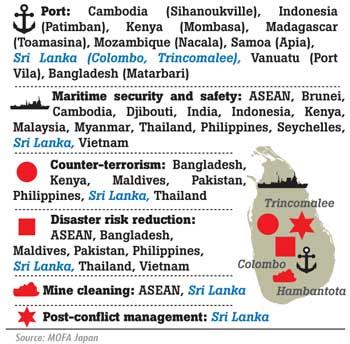Reply To:
Name - Reply Comment
 Sri Lanka is a country that has been strategically placed in the Indian Ocean. But, sadly, she hasn’t been able to take full use of her geopolitical significance. Statistically speaking, the Southeast Asian region only accounts for 13.1% of global trade, while it plays host to 30% of the global population.
Sri Lanka is a country that has been strategically placed in the Indian Ocean. But, sadly, she hasn’t been able to take full use of her geopolitical significance. Statistically speaking, the Southeast Asian region only accounts for 13.1% of global trade, while it plays host to 30% of the global population.
From a Sri Lankan perspective, many successful sectors contributing to its economy are based on maritime trade. These include port services related to cargo shipments, trans-shipment and related services. In the meantime, Hambantota and Trincomalee Ports too will commence functions in addition to the rapidly developing Colombo Port City.It is in such a backdrop that Japan, one of Sri Lanka’s important allies has included Sri Lanka as a benefitting nation in the ‘Free and Open Indo-Pacific’ (FOIP) concept. During a recent visit to Tokyo, the Daily Mirror sat through a briefing that highlighted the importance of this concept and its significance to Sri Lanka.
FOIP and its three pillars
 This concept looks at connecting two continents, namely Asia and Africa and the Indian and Pacific Oceans. As a region vulnerable to piracy, terrorism and natural disasters, Japan aims to promote peace, stability and prosperity across the Indo-Pacific thereby making it free and open.
This concept looks at connecting two continents, namely Asia and Africa and the Indian and Pacific Oceans. As a region vulnerable to piracy, terrorism and natural disasters, Japan aims to promote peace, stability and prosperity across the Indo-Pacific thereby making it free and open.
The three pillars of the concept include promotion and establishment of the rule of law, freedom of navigation and free trade, the pursuit of economic prosperity and commitment for peace and stability. After World War II Japan has promoted values including rule of law, democracy and human rights.
One of the main goals of conducting regional development projects was to improve connectivity within the region. Physical connectivity could be improved by ports, railways, roads and ICT. People-to-people connectivity could be ensured through human resources development and institutional connectivity through facilitating customs among others. Education and training could be provided through exchange programmes.
Economic partnerships could be strengthened by free trade agreements (FTAs) which would allow Japan to trade freely across the region. For Japan and other countries that depend on maritime trade, it is important to ensure maritime security in the region. In terms of its commitment to peace and stability, Japan provides capacity-building assistance to countries in the Indo-Pacific region by strengthening the capacity of maritime law enforcement, Maritime Domain Awareness (MDA) and other human resource development. The Indo-Pacific region is often threatened by natural disasters and Japan is ready to provide this assistance to have a more friendly relationship with South West Asia.
How it differs from China’s BRI
While Sri Lanka is already part of China’s Belt and Road Initiative (BRI) particularly with the Maritime Silk Road, its geopolitical significance is already in the spotlight.
The Maritime Silk Road aims to connect a multitude of countries via sea routes and infrastructure. But it has faced challenges with obtaining the support and cooperation from emerging economies such as India. When asked about the difference between FOIP and BRI, the Daily Mirror learned that FOIP promotes quality infrastructure. This means that Japan wants to promote infrastructure in the region with openness, transparency, economic efficiency and sustainability. According to Prime Minister Abe, Japan is happy to cooperate with China if they too are committed to the above-mentioned values.
The Asian Development Bank estimates that developing Asia requires USD 26 trillion in terms of infrastructure development from 2016- 2030 and Japan has decided to make a significant contribution. When Sri Lanka fell into the Chinese debt trap, it agreed to give away the Hambantota Port on a 99-year lease.
Today Sri Lanka is indebted to China than any of its international lenders. During the G7 Summit which took place in Tokyo in 2016 five principles guiding ‘Quality Infrastructure’ projects were announced. These included effective governance and economic efficiency in view of lifecycle costs as well as safety and resilience against natural disasters, terrorism and cyber-attack risks, job creation, capacity building and the transfer of expertise and know-how for local communities and addressing social and environmental impacts among others.

If Sri Lankan coast guards want to build their own air space patrolling capabilities I don’t know why we should say no as long as it is not interpreted by the Chinese as a threat
Eradicating poverty
According to statistics by the World Bank, 30% of poverty-stricken people live in the South West Asian region. However, Japan is aware that poverty is a big regional problem and is determined to fight against it. By balancing the three main pillars withholding FOIP, the Japanese government believes that it will be able to foster economic growth and stability in the region and that will help resolve issues such as poverty.
As the first Sustainable Development Goal (SDG) Japan is determined to eradicate poverty through this concept. South-West Asia has a lot of potential as a region. It has already identified Africa as a developing continent even though they face challenges including poverty and terrorism. Therefore, Japan aims to provide nation-building assistance in the area of development as well as politics and governance in a way that respects the ownership of African countries.
Happy to encourage Sri Lanka’s efforts: Prof. Tadokoro
In his comments to the Daily Mirror, Masayuki Tadokoro, Professor of International Relations at Faculty of Law, Keio University said that Japan could support law enforcement within Sri Lanka’s territorial waters by assisting coastal guards.
“We already provide such support to Indonesia and the Philippines. If Sri Lankan coast guards want to build their own air space patrolling capabilities I don’t know why we should say no as long as it is not interpreted by the Chinese as a threat. We are heavily dependent on the South China Sea but there’s a tension created by Chinese already. The stability of the Indian Ocean is heavily connected with the prosperity of Southeast Asia. Our strategy is to encourage whatever strategy you come up with and as long as it is consistent with our principles we are happy to encourage your efforts. But our experience in Southeast Asia tells us that no matter how fertile you are, no matter how big or how prepared your territory is international trade has been the key economic trump card in Southeast Asia. Therefore, whether it is subsidizing with their industries, exposing industries to international competition or importing cheap items from abroad is much more efficient and less corrupting.”